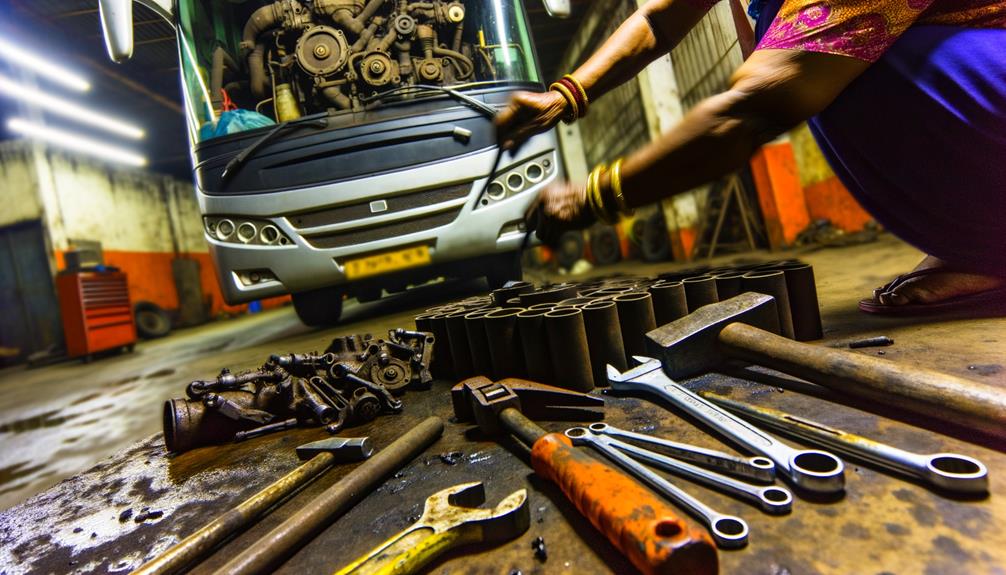Top Repairs for Coach Buses: A Personal Journey
When you think about coach bus repairs, what comes to mind? You've likely encountered a range of challenges, from engine inefficiencies to unexpected electrical failures. Each repair not only impacts performance but also affects passenger comfort and safety. As you navigate through these common issues, you'll discover essential maintenance practices that can save time and money. But what happens when the repairs you undertake lead to unforeseen complications, or worse, reveal deeper systemic problems? There's much more to explore in this journey of upkeep and improvement.
Understanding Prevost Coach Buses
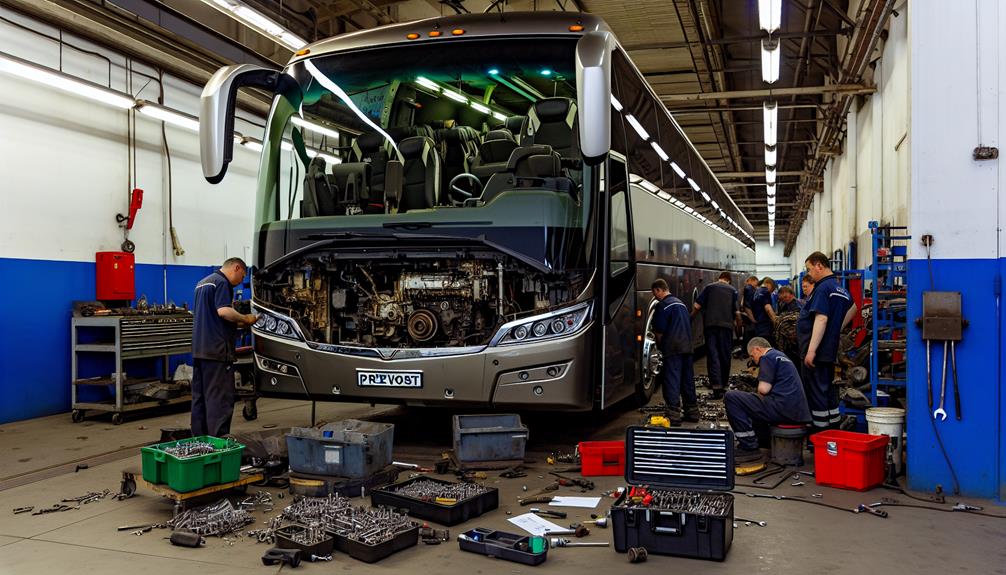
Prevost coach buses are renowned for their durability and performance in the transportation industry, making them a popular choice for both commercial and private use. Understanding their rich Prevost history is essential, as the brand has continuously evolved to enhance coach features, guaranteeing comfort and reliability.
When you own a Prevost, you'll want to prioritize maintenance tips to keep your bus in peak condition. Regular inspections of the braking system and tires can greatly enhance safety standards, reducing the risk of accidents. It's also important to monitor engine performance and fuel efficiency, as these factors directly affect your operational costs.
Performance enhancements are a hallmark of Prevost coaches, with innovations that improve aerodynamics and reduce drag. These features contribute not only to overall driving experience but also to better fuel economy, giving you the freedom to travel further for less.
Additionally, adhering to recommended maintenance schedules not only prolongs your coach's lifespan but also maintains compliance with safety standards. By focusing on these aspects, you can enjoy the reliability and luxury that Prevost coach buses are known for, making your journeys both enjoyable and safe.
Common Engine Issues
When it comes to maintaining your coach bus, being aware of common engine issues can save you time and money. One of the most prevalent problems is a drop in fuel efficiency. If you notice your bus consuming more fuel than usual, it could indicate issues like clogged fuel injectors or a malfunctioning fuel pump. Regular engine diagnostics can help you pinpoint these problems before they escalate.
Another common engine issue is overheating. This often stems from a faulty thermostat or a failing water pump. If your engine temperature gauge starts climbing, it's vital to act quickly to prevent severe damage. Check your coolant levels regularly and verify all hoses are intact.
Strange noises from the engine compartment can also signal trouble. Knocking sounds might suggest worn bearings, while hissing could indicate a coolant leak. Trust your instincts; don't ignore these signs.
Transmission Troubles
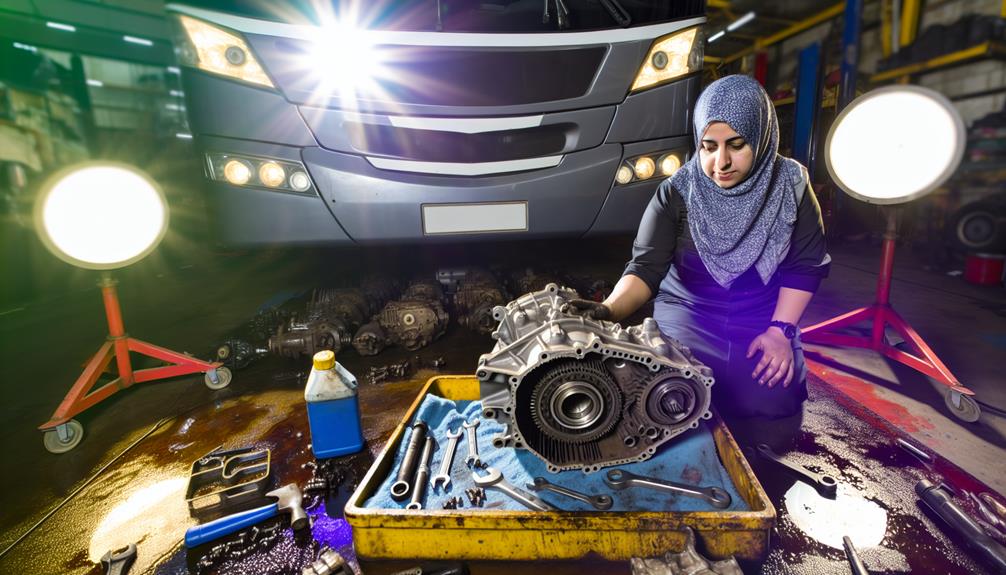
Engine issues aren't the only concerns for coach bus operators; transmission troubles can also lead to significant downtime and costly repairs. A malfunctioning transmission can cripple your bus, cutting into your schedule and budget. To avoid these pitfalls, you need to stay proactive with transmission diagnostics. Regularly scanning for error codes can help catch potential issues before they escalate into major repairs.
Fluid maintenance is critical as well. Confirm you're checking and changing the transmission fluid according to the manufacturer's recommendations. Low or contaminated fluid can cause overheating, which might damage internal components. Pay attention to the fluid's color and consistency; if it appears burnt or has a gritty texture, it's time for a change.
If you notice any signs of slipping gears or unusual noises when shifting, don't delay in seeking professional help. Ignoring these symptoms can lead to more extensive damage, resulting in expensive repairs and extended downtime. By prioritizing transmission diagnostics and fluid maintenance, you'll keep your coach bus running smoothly, allowing you the freedom to serve your passengers without interruptions.
Electrical System Failures
Many coach bus operators encounter electrical system failures that can disrupt operations and compromise safety. When you notice dimming lights or malfunctioning controls, it's important to perform thorough wiring diagnostics. Start by inspecting the wiring harness for frayed wires or loose connections, as these issues often lead to intermittent failures that can escalate if ignored.
Proper battery management is vital for maintaining electrical integrity. Verify your batteries are correctly charged and regularly tested for voltage consistency. A weak battery can cause cascading failures throughout the electrical system, affecting everything from your dashboard indicators to the bus's critical safety features.
If you face persistent problems, consider using specialized diagnostic tools to pinpoint faults in the electrical system. These tools can help identify short circuits or ground issues that may not be visible during a standard inspection.
Suspension and Wheel Repairs
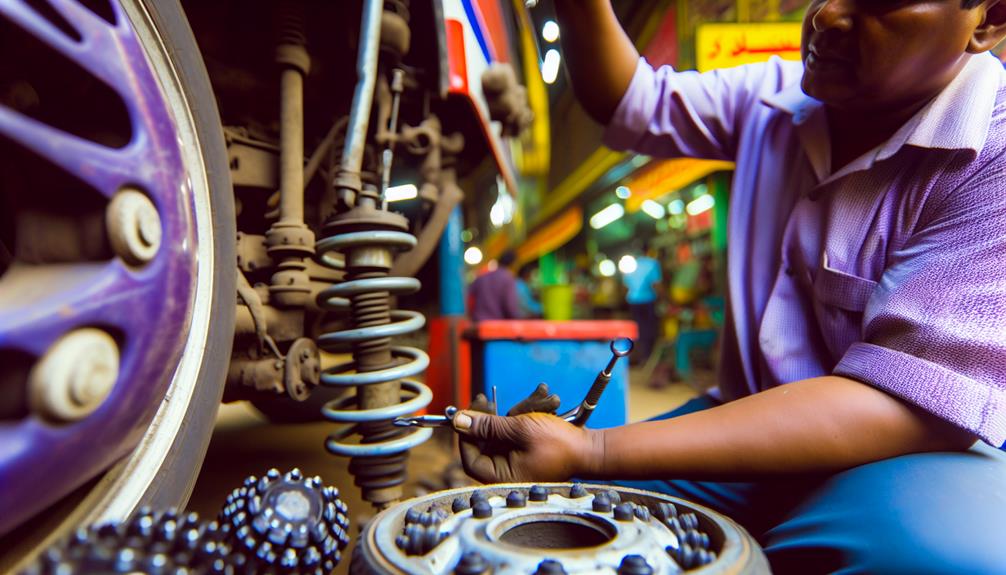
Maintaining the integrity of your coach bus's suspension and wheel systems is essential for ensuring passenger comfort and vehicle safety. A well-functioning suspension system absorbs shocks and maintains stability, while precise wheel alignment prevents uneven tire wear and enhances handling.
Here's a quick guide to common suspension and wheel repairs:
| Repair Type | Description | Benefits |
|---|---|---|
| Suspension Upgrades | Replacing worn-out components with higher-quality parts | Improved ride quality and stability |
| Wheel Alignment | Adjusting the angles of the wheels to manufacturer specifications | Enhanced tire longevity and fuel efficiency |
| Shock Absorber Replacement | Swapping old absorbers for new ones | Better handling and passenger comfort |
| Tire Rotation | Moving tires to different positions on the bus | Even tire wear and extended lifespan |
Prioritize regular inspections and consider suspension upgrades if you notice excessive bouncing or uneven tire wear. Investing in proper wheel alignment can save you money in the long run by extending the life of your tires. With these repairs, you'll keep your coach bus ready for the open road, providing the freedom your passengers crave.
HVAC System Maintenance
A well-functioning HVAC system is essential for passenger comfort and safety in coach buses. To maintain peak performance, you need to stay on top of regular maintenance tasks. Start with filter replacement; a clogged filter restricts airflow, causing the system to work harder and reducing efficiency. Aim to replace filters every few months, especially during peak travel seasons.
Next, consider the refrigerant recharge. If you notice inadequate cooling, it might be due to low refrigerant levels. This can happen due to leaks or normal system wear. Regularly check refrigerant levels and recharge as necessary to keep the system running smoothly.
Don't overlook the importance of cleaning the evaporator and condenser coils. Dust and debris can accumulate, hindering heat exchange and leading to system failure. Use a soft brush or vacuum to gently clean these components, making sure they're free from obstructions.
Lastly, regularly inspect the ductwork for any signs of wear or damage. Sealing leaks can greatly improve efficiency and guarantee a comfortable environment for your passengers. By diligently maintaining your HVAC system, you'll assure that everyone enjoys a pleasant ride, allowing for that freedom you all seek.
Brake System Overhauls
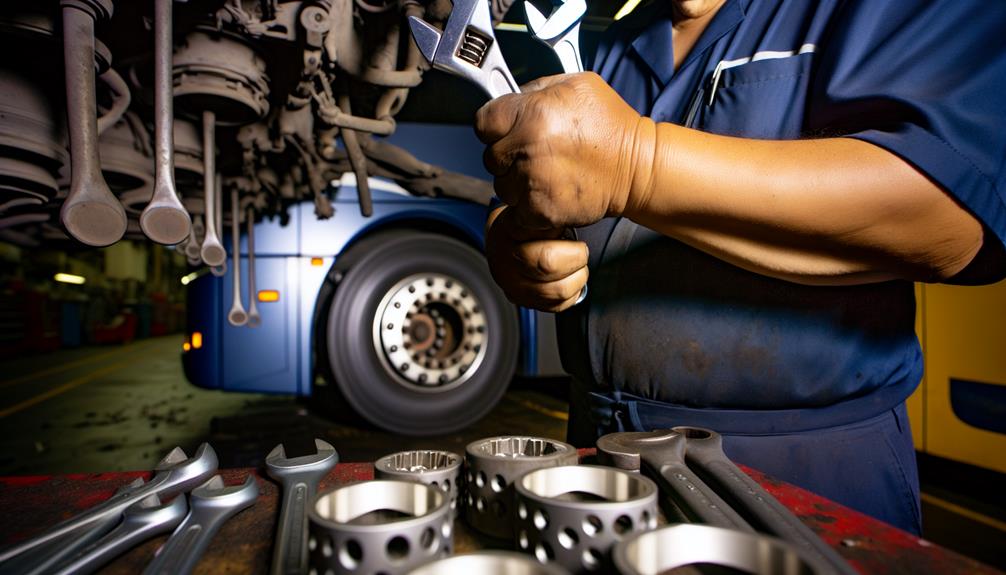
When it comes to guaranteeing the safety and reliability of coach buses, a thorough brake system overhaul is non-negotiable. Neglecting this essential aspect can lead to catastrophic failures, endangering passengers and drivers alike. Here's what you need to focus on during an overhaul:
- Inspect brake fluid levels: Confirm the brake fluid is clean and at the recommended levels to maintain peak performance.
- Replace brake pads: Worn brake pads can severely compromise stopping power, so replacing them regularly is fundamental.
- Check brake lines: Look for leaks or wear in the brake lines that could lead to brake failure.
- Caliper inspection: Verify calipers are functioning correctly to prevent uneven wear and maintain balance during braking.
Interior Upgrades and Fixes
Upgrading and fixing the interior of coach buses not only enhances passenger comfort but also boosts the overall aesthetic and functionality of the vehicle. One of the most impactful changes you can make involves seat upholstery. By replacing worn-out materials with high-quality, durable fabrics, you can create a more inviting atmosphere. Opt for materials that are both comfortable and easy to clean, ensuring they withstand heavy use.
Next, consider lighting enhancements. Upgrading to LED lighting not only improves energy efficiency but also allows you to create a more vibrant and welcoming environment. You can install adjustable lighting options, letting passengers customize their experience according to their preferences. This small change can markedly elevate the overall ambiance of the bus.
Additionally, don't overlook storage solutions. Implementing smart storage compartments can keep the interior organized, allowing passengers to stow their belongings securely.
Routine Preventative Measures
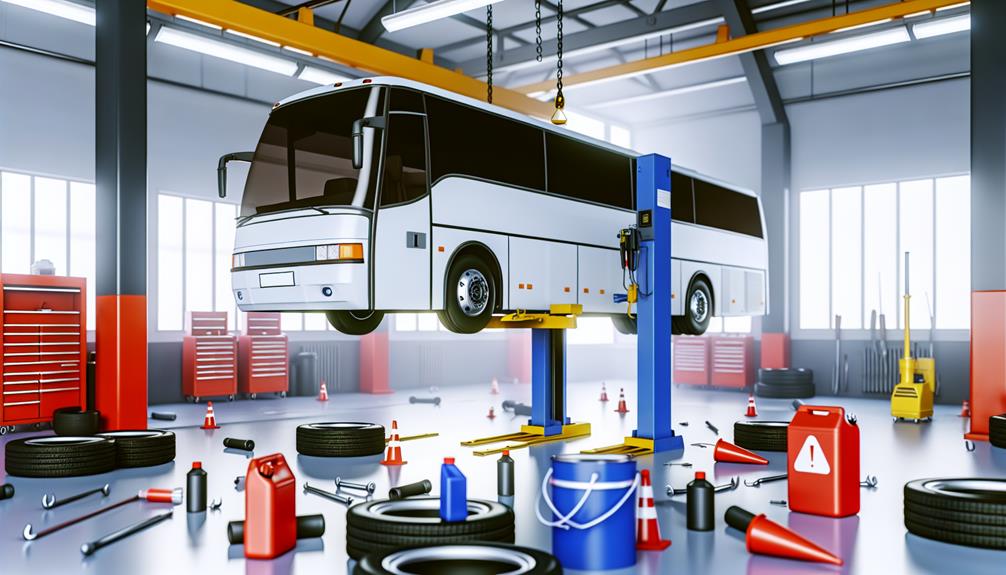
Regular preventative measures are essential for maintaining the longevity and reliability of coach buses. By taking a proactive approach, you can avoid costly repairs and guarantee a smooth journey for your passengers. Here are key routine tasks you should prioritize:
- Tire Maintenance: Regularly inspect tire pressure and tread depth. Properly inflated tires improve fuel efficiency and safety.
- Fluid Checks: Monitor engine oil, coolant, and brake fluid levels. Keeping fluids at ideal levels prevents overheating and mechanical failure.
- Brake Inspections: Regularly examine brake pads and rotors. Efficient brakes are critical for passenger safety, especially in high-demand situations.
- Battery Testing: Check battery connections and charge levels. A reliable battery guarantees your coach starts without issues.

